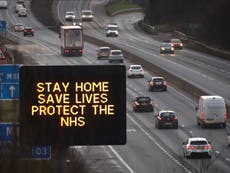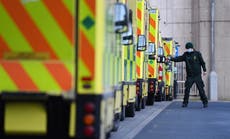Elections in May set to be delayed again, Boris Johnson hints
As well as local and mayoral elections in England, the Scottish Parliament and Welsh Assembly are meant to go to the polls
Your support helps us to tell the story
From reproductive rights to climate change to Big Tech, The Independent is on the ground when the story is developing. Whether it's investigating the financials of Elon Musk's pro-Trump PAC or producing our latest documentary, 'The A Word', which shines a light on the American women fighting for reproductive rights, we know how important it is to parse out the facts from the messaging.
At such a critical moment in US history, we need reporters on the ground. Your donation allows us to keep sending journalists to speak to both sides of the story.
The Independent is trusted by Americans across the entire political spectrum. And unlike many other quality news outlets, we choose not to lock Americans out of our reporting and analysis with paywalls. We believe quality journalism should be available to everyone, paid for by those who can afford it.
Your support makes all the difference.Crucial mayoral and local elections in May are set to be delayed, Boris Johnson has hinted – meaning voters will not have gone to the polls for more than two years.
“Obviously, we will have to keep it under review,” the prime minister told MPs, ahead of a vote to confirm the fresh lockdown until the end of March.
It is believed that ministers are pushing for the polls to be delayed until the spring or early summer – when Covid-19 infections will be lower – but some local leaders fear they will have to be even later.
The option of holding the elections with postal votes only has already been ruled out, it is thought.
As well as local and mayoral elections in England – axed 12 months ago, when the pandemic broke out – the Scottish Parliament and Welsh Assembly are meant to go to the polls.
The Scottish National Party’s expected triumph would deliver Nicola Sturgeon with a fresh mandate to demand a second independence referendum, which Mr Johnson intends to reject.
In the Commons, the prime minister was asked only about the likelihood of elections in England going ahead in four months’ time.
“That’s what the law provides for,” he replied, before adding “though, obviously, we will have to keep it under review.”
No 10 later made clear that the timing of elections in Scotland and Wales was a matter for the devolved governments there.
Sadiq Khan is expected to triumph for Labour in London, if the City Hall election goes ahead, but some of the eight other metro-mayor posts around England are held by Conservatives.
Keir Starmer – having pushed Labour back to level-pegging in the polls, a year after the party’s general election drubbing – would hope to win several hundred local council seats.
The UK did go to the polls in December 2019, when Mr Johnson won a big Commons majority, but no local elections have taken place since May 2019.
The new threat to elections came as the prime minister admitted the escape from the fresh lockdown was hugely uncertain and may be delayed until the end of March.
“Our emergence from the lockdown cocoon will not be a big bang but a gradual unwrapping,” he told MPs.
“That is why the legislation this House will vote on later today runs until March 31 –
not because we expect the full national lockdown to continue until then but to allow a steady, controlled and evidence-led move down through the tiers on a regional basis.”
He said there would be “continuous review” of the measures, with a statutory requirement to look at them every fortnight, but rejected a Tory call for regular votes in the Commons.
“After the marathon of last year we are indeed now in a sprint, a race to vaccinate the vulnerable faster than the virus can reach them,” MPs were told.






Join our commenting forum
Join thought-provoking conversations, follow other Independent readers and see their replies
Comments